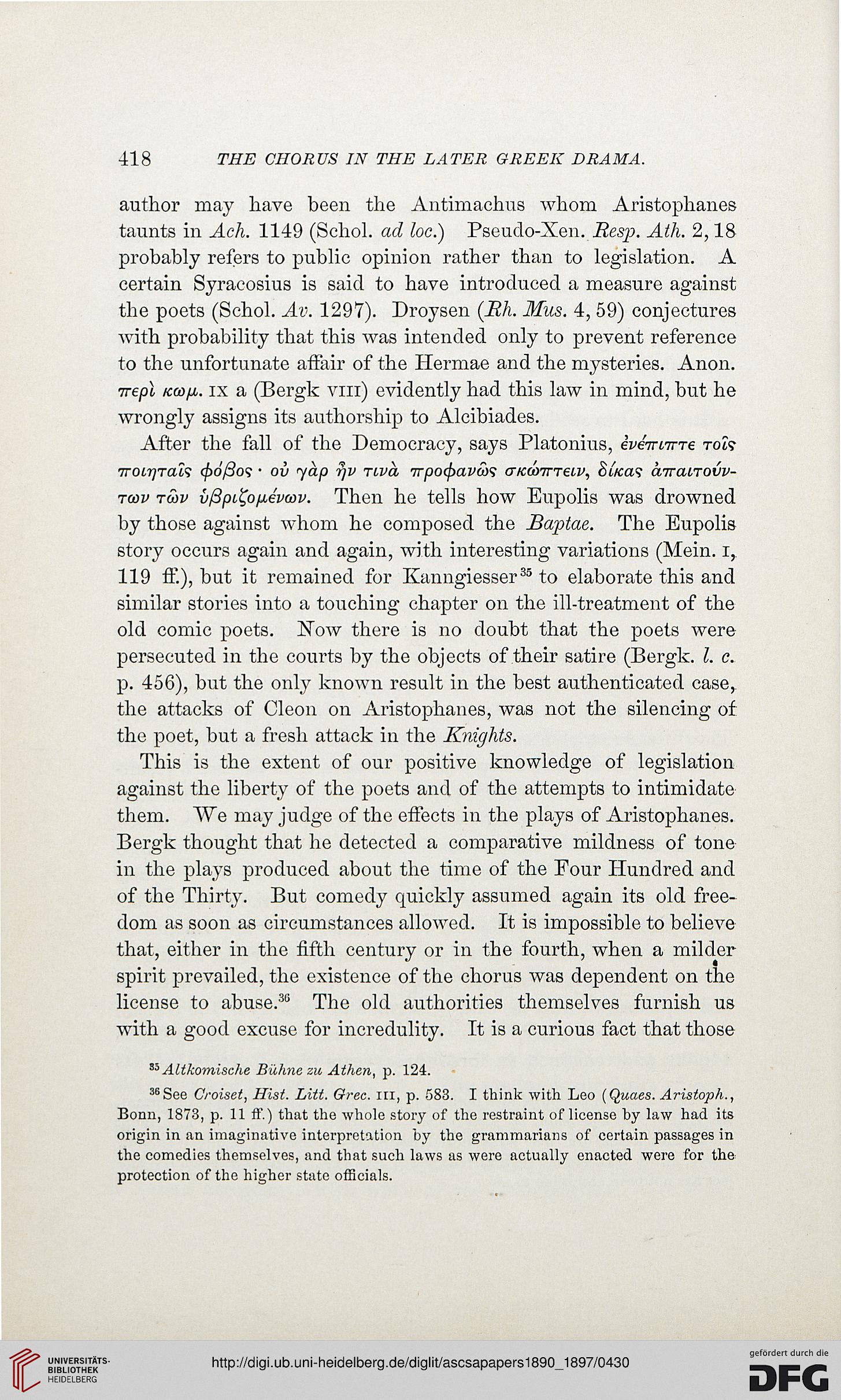418
THE CHORUS IN THE LATER GREEK DRAMA.
author may have been the Antimachus whom Aristophanes
taunts in Ach. 1149 (Schol. ad loc.) Pseudo-Xen. Resjy. Ath. 2,18
probably refers to public opinion rather than to legislation. A
certain Syracosius is said to have introduced a measure against
the poets (Schol. Av. 1297). Droysen (Bh. Mus. 4, 59) conjectures
with probability that this was intended only to prevent reference
to the unfortunate affair of the Hermae and the mysteries. Anon.
Trepl iccofi. ix a (Bergk vni) evidently had this law in mind, but he
wrongly assigns its authorship to Alcibiades.
After the fall of the Democracy, says Platonius, iveirnrTe toZ?
Troirjrali cf)6/3o<; • ov yap rjv riva Trpocfravws cncwmeiv, Si/cas airaiTOVv-
to3v twv vfipi&jievmv. Then he tells how Eupolis was drowned
by those against whom he composed the Bajotae. The Eupolis
story occurs again and again, with interesting variations (Mein. i,
119 ff.), but it remained for Kanngiesser35 to elaborate this and
similar stories into a touching chapter on the ill-treatment of the
old comic poets. Now there is no doubt that the poets were
persecuted in the courts by the objects of their satire (Bergk. I. c.
p. 456), but the only known result in the best authenticated case,
the attacks of Cleon on Aristophanes, was not the silencing of
the poet, but a fresh attack in the Knights.
This is the extent of our positive knowledge of legislation
against the liberty of the poets and of the attempts to intimidate
them. We may judge of the effects in the plays of Aristophanes.
Bergk thought that he detected a comparative mildness of tone
in the plays produced about the time of the Four Hundred and
of the Thirty. But comedy quickly assumed again its old free-
dom as soon as circumstances allowed. It is impossible to believe
that, either in the fifth century or in the fourth, when a milder
spirit prevailed, the existence of the chorus was dependent on the
license to abuse.30 The old authorities themselves furnish us
with a good excuse for incredulity. It is a curious fact that those
*5Altkomische Bithne zu Athen, p. 124.
36See Croiset, Hist. Litt. Orec. Ill, p. 583. I think with Leo (Quaes. Arisioph.,
Bonn, 1873, p. 11 ff.) that the whole story of the restraint of license by law had its
origin in an imaginative interpretation by the grammarians of certain passages in
the comedies themselves, and that such laws as were actually enacted were for the
protection of the higher state officials.
THE CHORUS IN THE LATER GREEK DRAMA.
author may have been the Antimachus whom Aristophanes
taunts in Ach. 1149 (Schol. ad loc.) Pseudo-Xen. Resjy. Ath. 2,18
probably refers to public opinion rather than to legislation. A
certain Syracosius is said to have introduced a measure against
the poets (Schol. Av. 1297). Droysen (Bh. Mus. 4, 59) conjectures
with probability that this was intended only to prevent reference
to the unfortunate affair of the Hermae and the mysteries. Anon.
Trepl iccofi. ix a (Bergk vni) evidently had this law in mind, but he
wrongly assigns its authorship to Alcibiades.
After the fall of the Democracy, says Platonius, iveirnrTe toZ?
Troirjrali cf)6/3o<; • ov yap rjv riva Trpocfravws cncwmeiv, Si/cas airaiTOVv-
to3v twv vfipi&jievmv. Then he tells how Eupolis was drowned
by those against whom he composed the Bajotae. The Eupolis
story occurs again and again, with interesting variations (Mein. i,
119 ff.), but it remained for Kanngiesser35 to elaborate this and
similar stories into a touching chapter on the ill-treatment of the
old comic poets. Now there is no doubt that the poets were
persecuted in the courts by the objects of their satire (Bergk. I. c.
p. 456), but the only known result in the best authenticated case,
the attacks of Cleon on Aristophanes, was not the silencing of
the poet, but a fresh attack in the Knights.
This is the extent of our positive knowledge of legislation
against the liberty of the poets and of the attempts to intimidate
them. We may judge of the effects in the plays of Aristophanes.
Bergk thought that he detected a comparative mildness of tone
in the plays produced about the time of the Four Hundred and
of the Thirty. But comedy quickly assumed again its old free-
dom as soon as circumstances allowed. It is impossible to believe
that, either in the fifth century or in the fourth, when a milder
spirit prevailed, the existence of the chorus was dependent on the
license to abuse.30 The old authorities themselves furnish us
with a good excuse for incredulity. It is a curious fact that those
*5Altkomische Bithne zu Athen, p. 124.
36See Croiset, Hist. Litt. Orec. Ill, p. 583. I think with Leo (Quaes. Arisioph.,
Bonn, 1873, p. 11 ff.) that the whole story of the restraint of license by law had its
origin in an imaginative interpretation by the grammarians of certain passages in
the comedies themselves, and that such laws as were actually enacted were for the
protection of the higher state officials.




